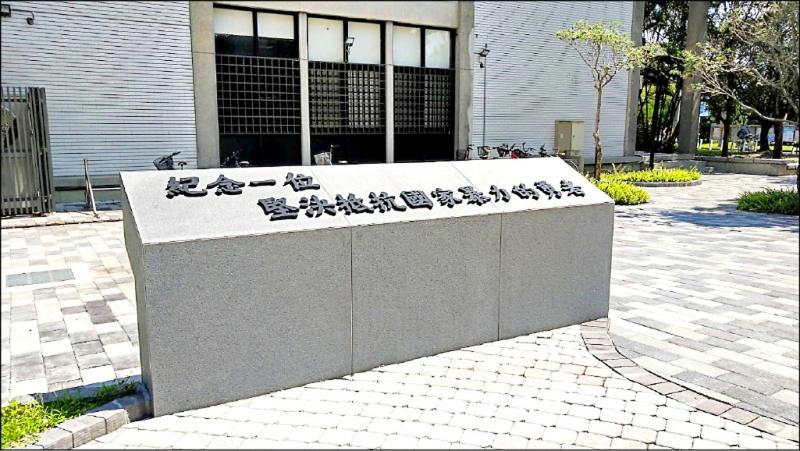The government should reopen the investigation into the homicide of Chen Wen-chen (陳文成), as questions about the incident four decades ago remain unresolved, the New Power Party said yesterday.
Chen, an assistant professor of mathematics at Carnegie Mellon University in the US, returned to visit family in Taiwan in 1981 and was found dead near a library at National Taiwan University (NTU) on July 3 that year.
A day earlier, the 31-year-old democracy advocate had been detained and interrogated by the Taiwan Garrison Command, a state security force that has since been disbanded. Although Chen died 41 years ago, “the complete truth of the incident” remains unknown, the party said in a statement.

Photo courtesy of the National Taiwan University Student Association
An investigation report published by the Transitional Justice Commission in May said that Chen was likely murdered by the Taiwan Garrison Command.
However, details such as the identity of the murderer were not included in the investigation due to the unavailability of key political files, the party said.
Some of these files were destroyed, while others were difficult to obtain because they are stored within different agencies, it said.
The National Security Council and Investigative Bureau should be held accountable for refusing to release the files on national security or diplomatic grounds, the party said.
“In July last year, we had agreed with the Transitional Justice Commission’s proposal to reopen the investigation of the Chen Wen-chen incident. Since Chen was believed to be murdered and the government was involved in the case, the Ministry of Justice should launch another investigation so that the truth of the incident can be fully uncovered,” the party said.
The party also proposed that the Article 11 of the Political Archives Act (政治檔案條例) be amended to prevent intelligence agencies from withholding information in such investigations on security or confidentiality grounds.
Academia Historica recently published eight volumes of historical materials related to 1979’s Kaohsiung Incident, also known as the Formosa Incident, in which pro-democracy demonstrations were violently broken up by government forces.
However, the party said that certain material in the volumes was redacted at the request of national security officials.
“The Transitional Justice Commission said that information related to the Formosa Incident should be made public,” the party said, adding that the release of all related historical documents should be made legal through an amendment to the act.
The amendment should also list reasons used to withhold information that can be vetted by a higher authority, the party said.

Taiwan has received more than US$70 million in royalties as of the end of last year from developing the F-16V jet as countries worldwide purchase or upgrade to this popular model, government and military officials said on Saturday. Taiwan funded the development of the F-16V jet and ended up the sole investor as other countries withdrew from the program. Now the F-16V is increasingly popular and countries must pay Taiwan a percentage in royalties when they purchase new F-16V aircraft or upgrade older F-16 models. The next five years are expected to be the peak for these royalties, with Taiwan potentially earning

STAY IN YOUR LANE: As the US and Israel attack Iran, the ministry has warned China not to overstep by including Taiwanese citizens in its evacuation orders The Ministry of Foreign Affairs (MOFA) yesterday rebuked a statement by China’s embassy in Israel that it would evacuate Taiwanese holders of Chinese travel documents from Israel amid the latter’s escalating conflict with Iran. Tensions have risen across the Middle East in the wake of US and Israeli airstrikes on Iran beginning Saturday. China subsequently issued an evacuation notice for its citizens. In a news release, the Chinese embassy in Israel said holders of “Taiwan compatriot permits (台胞證)” issued to Taiwanese nationals by Chinese authorities for travel to China — could register for evacuation to Egypt. In Taipei, the ministry yesterday said Taiwan

Taiwan is awaiting official notification from the US regarding the status of the Agreement on Reciprocal Trade (ART) after the US Supreme Court ruled US President Donald Trump's global tariffs unconstitutional. Speaking to reporters before a legislative hearing today, Premier Cho Jung-tai (卓榮泰) said that Taiwan's negotiation team remains focused on ensuring that the bilateral trade deal remains intact despite the legal challenge to Trump's tariff policy. "The US has pledged to notify its trade partners once the subsequent administrative and legal processes are finalized, and that certainly includes Taiwan," Cho said when asked about opposition parties’ doubts that the ART was

If China chose to invade Taiwan tomorrow, it would only have to sever three undersea fiber-optic cable clusters to cause a data blackout, Jason Hsu (許毓仁), a senior fellow at the Hudson Institute and former Chinese Nationalist Party (KMT) legislator, told a US security panel yesterday. In a Taiwan contingency, cable disruption would be one of the earliest preinvasion actions and the signal that escalation had begun, he said, adding that Taiwan’s current cable repair capabilities are insufficient. The US-China Economic and Security Review Commission (USCC) yesterday held a hearing on US-China Competition Under the Sea, with Hsu speaking on